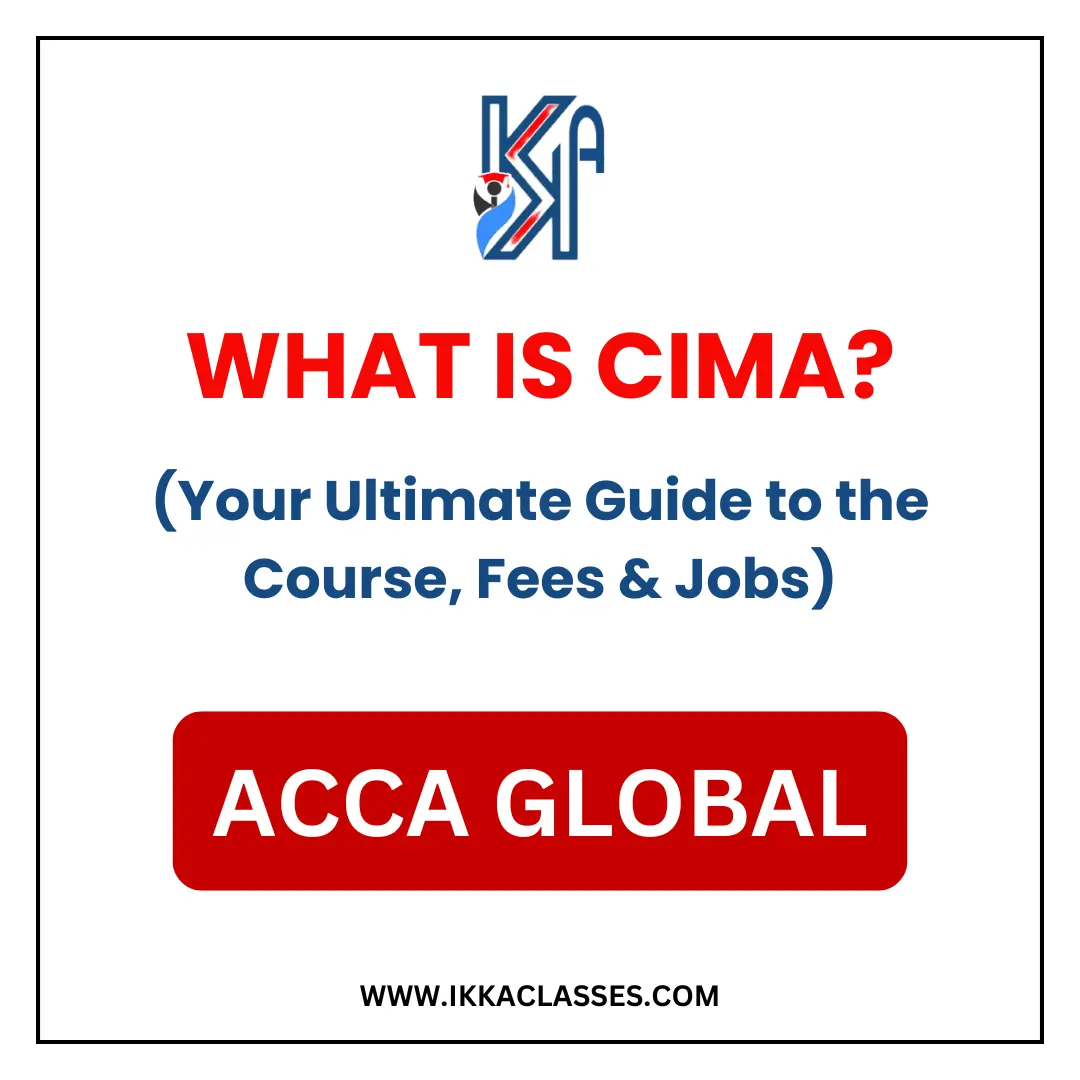Are you at a career crossroads, wondering how to become a strategic decision-maker? In today’s fast-paced global business world, companies need finance leaders who can shape the future. They’re looking for professionals who can analyze data, drive growth, and manage risk.
If this sounds like the career you want, you’re in the right place. Welcome to your ultimate guide to the Chartered Institute of Management Accountants (CIMA) qualification.
This is more than just an overview; it’s a deep dive into a qualification that serves as a global passport to a career in business and finance. We’ll explore every facet of the CIMA journey—from the structure of the CIMA course and the challenge of its exams to the incredible salary and CIMA jobs that await you. Prepare to discover how CIMA can transform your career and position you as a leader in the business world.
Table of Contents
ToggleWhat Does CIMA Stand For and Mean?
On the surface, the CIMA full form is the Chartered Institute of Management Accountants. But to truly grasp its significance, you need to look beyond the words and understand the powerful meaning behind them. This isn’t just an acronym; it’s a statement of prestige, purpose, and professional identity that signals a specific, high-value skill set to employers worldwide. For anyone aspiring to a leadership role in finance, understanding the depth of the CIMA brand is the first step in appreciating the career transformation it offers. It’s about joining a legacy of professionals who don’t just report on the business but actively shape its future. Let’s decode what it truly means for your career.
What is the Official CIMA Full Form?
The official name, Chartered Institute of Management Accountants, is a clear declaration of its three core pillars, each carrying significant weight in the professional world.
- Chartered: This term is protected by law in the UK and recognized globally as a mark of the highest professional competence and ethical standards. Achieving ‘Chartered’ status signifies that you have reached the pinnacle of your profession, backed by a Royal Charter. It brings with it immense prestige, trust, and a commitment to lifelong learning and ethical conduct that employers value immensely. It’s a guarantee of quality.
- Institute: This signifies a global community and a professional body, not just a training course. When you join CIMA, you are becoming part of a worldwide network of over 696,000 students, members, and professionals across 192 countries. This institute provides lifelong learning, cutting-edge research, resources, and a powerful network to support your entire career, from your first exam to your role as a CFO.
- Management Accountants: This is the crucial differentiator. Unlike traditional accountants who focus on historical data and external reporting for compliance (like audits and tax), management accountants are forward-looking. They are the strategic heart of the business, using financial and non-financial data to inform strategy, manage performance, and create sustainable value from within an organization. They are the architects of business decisions.
Understanding the Deeper CIMA Meaning in the Business World
In the business world, the CIMA meaning is synonymous with “strategic business partner.” A CIMA-qualified professional is a hybrid leader—someone with the financial rigor of an accountant and the commercial acumen of a CEO. They are trained to break down departmental silos, acting as translators who can explain complex financial data to colleagues in marketing, operations, and HR, ensuring the entire organization is aligned with its strategic objectives. The CIMA qualification is designed to develop this unique blend of skills, making its members indispensable in modern business. You’ll be trained not just to understand the numbers, but to use them to tell a story about the future, to model different scenarios, and to help write the next chapter of your company’s success. This is why CIMA members are so sought after for roles that require not just financial expertise, but also leadership and strategic foresight.
What is the Context of the CIMA Full Form in Cost Accounting?
In the business world, the CIMA meaning is synonymous with “strategic business partner.av” A CIMA-qualified professional is a hybrid leader—someone with the financial rigor of an accountant and the commercial acumen of a CEO. They are trained to break down departmental silos, acting as translators who can explain complex financial data to colleagues in marketing, operations, and HR, ensuring the entire organization is aligned with its strategic objectives. The CIMA qualification is designed to develop this unique blend of skills, making its members indispensable in modern business. You’ll be trained not just to understand the numbers, but to use them to tell a story about the future, to model different scenarios, and to help write the next chapter of your company’s success. This is why CIMA members are so sought after for roles that require not just financial expertise, but also leadership and strategic foresight.
A Detailed Breakdown of the CIMA Course and CIMA Qualification

The CIMA qualification represents a fundamental shift in the world of finance, moving professionals from a reactive, historical-reporting role to a proactive, forward-looking strategic function. In the complex economy of 2025, businesses need leaders who can navigate uncertainty, and the CIMA course is the world’s leading framework for developing these exact capabilities. Unlike traditional accounting paths that might keep you siloed within the finance department, CIMA builds your expertise from the inside out. It immerses you in the commercial heart of the organization, giving you the skills and the language to collaborate with every department. This comprehensive approach teaches you to use financial information for critical decision-making, turning you into an indispensable architect of business success and a trusted advisor to senior leadership.
Why is the CIMA Certification a Global Standard?
The status of the CIMA certification as a global gold standard rests on its rigorous standards and the unparalleled recognition provided by the Chartered Global Management Accountant (CGMA®) designation. The CGMA is awarded exclusively through the powerful partnership between CIMA and the American Institute of Certified Public Accountants (AICPA). This synergy creates a qualification that transcends borders, ensuring a universally high standard of performance. For an employer, hiring a CGMA means they are getting a professional with a verified, world-class skill set in strategic management and finance, regardless of where they qualified. This simplifies global talent acquisition and builds trust. Furthermore, this global standard is upheld by a strict Code of Ethics, which requires members to act with integrity and objectivity, providing an additional layer of assurance to businesses worldwide.
How Are the CIMA Levels and CIMA Stages Structured?
The CIMA journey is a thoughtfully designed progression, building your knowledge in a logical, layered manner. The architecture of the CIMA levels and CIMA stages mirrors a real career path, from a junior role to a senior leadership position, ensuring the skills you learn are immediately relevant at each step of your career.
- Certificate in Business Accounting (Cert BA): This is the foundational entry point for those without a background in business or finance. It covers the essential building blocks of accounting, economics, and business law, providing the core knowledge needed to advance.
- Professional Qualification: The core of the program, where you transform into a strategic leader. It is divided into three distinct levels:
- The Operational Level: Focuses on the short-term execution of strategy. You learn to prepare financial statements, manage working capital, and use data to make immediate operational decisions.
- The Management Level: Shifts the perspective to that of a middle manager, focusing on medium-term monitoring and reporting. Here you translate the long-term strategy into actionable plans and monitor performance against them.
- The Strategic Level: Adopts the mindset of a senior leader, focusing on long-term strategy and leadership. You will learn to formulate financial strategy, manage enterprise risk, and lead the organization through complex changes.
What Core CIMA Subjects Are Covered in the Syllabus?
The genius of the CIMA syllabus lies in its three-pillar structure: Enterprise, Performance, and Financial. This framework ensures every student develops a holistic understanding of business, producing well-rounded professionals who can speak the language of the entire organization. These pillars are woven through each of the professional levels, with the complexity of the CIMA course subjects increasing as you advance.
- The Enterprise Pillar (E): The “business context” pillar, covering topics like business models, project management, and strategic positioning. It gives you the commercial acumen to understand how the business operates in its market.
- The Performance Pillar (P): The “value creation” pillar, focusing on costing, budgeting, data analysis, and risk management. This is the heart of management accounting, giving you the tools to optimize business performance.
- The Financial Pillar (F): The “reporting and funding” pillar, covering financial standards, group accounts, and long-term financial strategy. This ensures your technical accounting skills are robust and linked to strategic goals.
What is the Average CIMA Course Duration?
The flexibility of the CIMA qualification means the CIMA course duration is a journey you can control, rather than a fixed timeline. For a dedicated professional studying part-time, completing the entire Professional Qualification typically takes between 2.5 to 4 years. This timeframe can be significantly shortened if you hold a relevant university degree in accounting or finance and are granted exemptions from certain exams. Navigating these factors can be complex, which is why the expert counselors at Ikka Classes help each student map out a personalized study plan. By assessing your unique background and goals, we help you find the fastest and most effective route to qualification, ensuring you don’t waste time on subjects you’ve already mastered. This personalized approach is key to successfully balancing work, life, and your CIMA studies.
Duration
Average Completion: 2.5–3 Years
Most learners finish the complete CIMA qualification in 2.5–3 years, depending on prior exemptions and study pace.
Flexibility
Level-wise Progression
Each level can be taken independently, letting you progress in a flexible, modular, self-paced manner.
- Start where you’re eligible (Certificate / Operational / Management / Strategic).
- Plan attempts around work, academics, or internships.
Exam Mode
Computer-Based Online Exams
All CIMA exams are conducted through secure, computer-based testing with global availability.
- Objective Tests: On-demand, year-round scheduling.
- Case Study Exams: Held four times a year — February, May, August, November.
How to Begin Your Journey: Eligibility and Exams
Embarking on the CIMA path is a significant decision, and understanding your starting line is the first step. The CIMA framework is designed to be both accessible and rigorous, providing clear entry points for individuals from all academic and professional backgrounds. This ensures that anyone with the ambition and dedication can start their journey, while the challenging exam process guarantees that every member who qualifies meets the same high global standard of competence. This section will guide you through the practical steps of determining your eligibility and understanding the modern, flexible exam structure that lies ahead.
What Are the Current CIMA Eligibility Requirements?
The CIMA eligibility requirements are structured to welcome talent from diverse starting points, making a career in business and finance accessible to a wide audience.
- Certificate in Business Accounting: This has an open entry policy, requiring no prior qualifications. If you’re a recent school leaver, a professional from a non-commerce background (like engineering or IT), or in a junior administrative role, this is your perfect starting point. All you need is a good command of English and Mathematics to begin building a strong foundation.
- Professional Qualification: To start directly at this level, you typically need a relevant degree in accounting or business, an MBA, or another recognized professional qualification like the AAT.
Before you register, it is crucial to check for exemptions on the official CIMA website. CIMA has a comprehensive database that allows you to input your existing qualifications and see which exams you may be able to bypass. This is not a shortcut; it’s a recognition of the knowledge you already possess, allowing you to focus your energy and investment on learning new, advanced skills.
How is the CIMA Exams Process Structured?
The CIMA exams are a modern assessment system designed to test not just what you know, but how you apply that knowledge in a real-world business context. The process is a strategic blend of knowledge acquisition and practical application, ensuring that CIMA members are not just exam-passers, but competent and effective business leaders.
- Objective Tests: These are 90-minute, on-demand exams for each of the nine subjects. Think of them as focused sprints designed to validate your technical understanding of each subject pillar. Their flexibility allows you to schedule them at thousands of testing centers around the globe at a time that fits your schedule.
- Case Study Exams: These are 3-hour exams that simulate a real-world business scenario, testing your ability to integrate knowledge from all three pillars to solve complex problems. This is where expert coaching makes all the difference. At Ikka Classes, our tutors specialize in deconstructing the pre-seen material and teaching the integrated thinking skills necessary to excel in these business simulations, giving you a significant advantage on exam day.
Investment vs. Return: Analyzing Costs and Career Benefits
Embarking on the CIMA qualification is one of the most significant investments you can make in your professional future. Like any smart investment, it requires an upfront commitment of resources—both financial and personal. However, the return on this investment, measured in career opportunities, professional prestige, and lifetime earning potential, is unparalleled. This section breaks down the financial commitment required and explores the lucrative career outcomes that make the CIMA journey a highly profitable endeavor for ambitious professionals in India and across the globe.
What Are the Estimated CIMA Course Fees?
The CIMA course fees are not paid in one large sum but are spread out over your studies, making them manageable for working professionals. The total investment is composed of an Initial Registration Fee, an Annual Subscription Fee, and individual Exam Fees. This “pay-as-you-go” model for exams gives you complete control over your expenditure. While the financial commitment is real, it pales in comparison to the dramatic increase in salary and career prospects that CIMA qualification holders enjoy. To make the most of this investment and improve your chances of passing exams on the first attempt—avoiding costly resits—partnering with an expert tuition provider is a smart strategy. Ikka Classes offers structured programs designed to maximize your return on investment by providing focused, effective preparation.
What Are the Estimated CIMA Course Fees?
The demand for strategic finance professionals has sent the value of CIMA members skyrocketing. The CIMA salary in India is consistently ranked among the highest in the finance and accounting sector, representing a clear and rapid return on your educational investment.
- Part-Qualified Professionals: Often range from ₹8 Lakhs to ₹15 Lakhs per annum (LPA), demonstrating value even before full qualification.
- Newly Qualified CIMA Members: Typically jump into the ₹18 Lakhs to ₹30 Lakhs LPA range, becoming prime candidates for roles like Finance Business Partner in top-tier multinational companies.
- Experienced Senior Management: Can command premium salaries from ₹40 Lakhs to well over ₹1 Crore LPA in roles like Chief Financial Officer (CFO).
These figures are a direct testament to the high-level strategic skills, business acumen, and ethical grounding that the CIMA qualification provides.
What Kind of CIMA Jobs Can You Expect to Secure?
The CIMA qualification opens up a universe of strategic roles, breaking you free from the confines of the traditional accounting department. The market for CIMA jobs is dynamic and diverse, especially for CIMA jobs in India, where companies are scaling rapidly and require sharp financial leadership. With CIMA, you’ll be a strong candidate for roles that place you at the very heart of the business:
- Finance Business Partner: The quintessential CIMA role, where you act as a dedicated financial advisor to commercial teams.
- Commercial Analyst: Analyzing pricing, market trends, and competitor activity to drive profitability.
- Financial Planning & Analysis (FP&A) Manager: Leading the budgeting, forecasting, and long-range planning processes.
- Financial Controller & Chief Financial Officer (CFO): The CIMA qualification provides a direct and proven pathway to the highest echelons of financial leadership.
CIMA vs. ACCA: Choosing the Right Path for Your Career
While CIMA is uniquely designed to make you a strategic business leader, another leading qualification is the ACCA (Association of Chartered Certified Accountants). Both are prestigious, UK-based ‘Chartered’ qualifications with immense global recognition, but they are designed for fundamentally different career paths. This section provides a clear, head-to-head comparison to help you make an informed decision.
CIMA vs ACCA: Industry Leader or Practice Professional?

| Feature | CIMA (Chartered Institute of Management Accountants) | ACCA (Association of Chartered Certified Accountants) |
|---|---|---|
| Primary Focus | Management Accounting & Business Strategy — using data to plan for the future and make internal decisions. | Financial Accounting & External Audit — reporting on past performance and ensuring compliance. |
| Orientation | Forward-looking and internal: performance management, budgeting, and strategy. | Historical and external: financial reporting standards (IFRS), taxation, and corporate law. |
| Key Skills | Decision support, strategic planning, risk analysis, and business partnering. | Technical accounting, financial compliance, auditing procedures, and tax advisory. |
| Ideal Career Path | Business & Industry — roles in corporations across sectors (tech, manufacturing, retail, etc.). | Public Practice — classic path in audit firms (PwC, Deloitte, EY, KPMG). |
| Typical Roles | Finance Business Partner, FP&A Manager, Management Consultant, CFO, CEO. | External Auditor, Financial Accountant, Tax Specialist, Compliance Officer, Audit Partner. |
The Verdict: Your choice depends entirely on where you want your career to take you. If you are passionate about strategy, influencing commercial decisions, and shaping a company’s future from within, CIMA is the clear choice. If you excel at technical accounting, enjoy the structure and rigor of financial reporting and audit, and envision a career in public practice or a specialized corporate reporting role, ACCA is the ideal pathway.
CIMA's Global Network: UK, India, and the Powerful AICPA Partnership
A professional qualification’s true power lies in its global recognition. CIMA excels in this regard, built on prestige in the CIMA UK, a growing presence in markets like CIMA India, and a game-changing alliance with the AICPA. This robust global ecosystem ensures that your CIMA qualification is not just a piece of paper but a key that unlocks doors worldwide. It provides unparalleled career mobility and a level of credibility that is instantly understood by employers in any country, making you a truly global professional. This network is a cornerstone of the CIMA value proposition, offering support, resources, and opportunities throughout your career.
Why Are CIMA UK and the CIMA London Headquarters Significant?
CIMA’s heritage is deeply rooted in the United Kingdom. Established by a Royal Charter—a prestigious instrument granted by the British monarch that signifies an organization’s commitment to the public interest—its standards were forged in one of the world’s most influential financial centers. The global headquarters in CIMA London means the qualification is benchmarked against the rigorous demands of a top-tier global city, home to multinational banks, fintech innovators, and corporate giants. This CIMA UK foundation provides an unparalleled level of prestige and authority that resonates globally. When an employer in any country sees the CIMA qualification, they understand it represents a standard of excellence tested in a highly competitive and complex financial ecosystem. This heritage guarantees that your skills are not just current but are also future-proofed by a body at the very heart of global commerce.
What is the Role and Importance of CIMA India?
While its standards are global, CIMA’s impact is delivered through a strong local presence. The role of CIMA India has become increasingly important as the country has solidified its position as a global economic powerhouse and a hub for Global Capability Centers (GCCs). The Indian offices provide a vital support system for a rapidly growing community of students and members. This includes offering tailored resources like webinars on local tax implications, hosting career fairs and networking events that connect professionals with top employers, and building strategic partnerships with Indian universities and corporations. For a student in India, this means you receive the full benefit of a globally respected UK qualification but with a local support network that understands the nuances of the Indian job market. This direct access to mentorship and opportunities is crucial for building a successful career and securing high-value CIMA jobs in India.
Explaining the Strategic Alliance Between AICPA and CIMA
The partnership between the AICPA and CIMA is arguably the most significant development in the accounting profession in the 21st century. It represents a powerful fusion of the world’s leading accounting bodies to create the first truly global designation for management accountants: the Chartered Global Management Accountant (CGMA). Upon completing the CIMA qualification and its practical experience requirements, you are automatically awarded the CGMA designation. This acts as a dual passport for your career. It gives your CIMA qualification instant recognition and credibility in the highly lucrative US job market and with thousands of American multinational corporations operating worldwide. Imagine you’re a professional from India applying to a US-based tech firm; the hiring manager in California will immediately recognize and trust the AICPA brand behind your CGMA title. People who search for “aicpa cima” are seeking to understand this powerful synergy. It is the single greatest testament to the CIMA qualification’s truly global nature.
Frequently Asked Questions About CIMA
Is CIMA difficult to pass?
Yes, the CIMA qualification is challenging because it tests real-world application, not just theory. Its difficulty ensures its high value to employers. Consistent study, especially with expert guidance from a trusted provider like Ikka Classes, is key to passing the CIMA exams.
Can I get a job with only the CIMA qualification?
Absolutely. The CIMA qualification is a powerful standalone credential. Employers highly value CIMA for strategic finance roles, making it sufficient to secure high-level CIMA jobs globally.
Is CIMA equivalent to a Master's degree?
Yes, the CIMA qualification is officially recognized as equivalent to a Master’s degree. Employers often value it more for its strong focus on practical, real-world business application.
How do I use the My CIMA student portal?
You can access the My CIMA portal using your CIMA login details on the official AICPA-CIMA website. It is your central dashboard for scheduling exams, paying fees, and accessing study resources.

